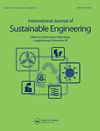Waste sorting practices of cambodians during covid-19
IF 3.6
Q3 GREEN & SUSTAINABLE SCIENCE & TECHNOLOGY
International Journal of Sustainable Engineering
Pub Date : 2022-04-20
DOI:10.1080/19397038.2022.2065704
引用次数: 8
Abstract
ABSTRACT The waste produced swings regardless of individual consumption patterns and social norm variations. People have been required to adapt their everyday dynamics due to the current context imposed by the Covid-19 outbreak. These adaptations in tradition have undoubtedly impacted the environment regarding waste generation and management. Hence, reducing the environmental harm of residential waste through waste segregation and handling is a practical approach. This work used a quantitative method and constructed a research instrument to investigate (398 participants) the determinants influencing Cambodian waste separating intentions and behaviours using the theory of planned behaviour (TPB) during the Covid-19 pandemic. The data was collected and analysed using PLS-SEM. The findings suggested that attitudes, social norms, and moral norms significantly impacted the intention to engage in waste separation and, hence, waste separation behaviour. In addition, the intention construct was found to be the most significant determinant of Cambodian social explicit waste sorting behaviour, suggesting that enhancing the intention of waste separation practice substantially affects waste separation behaviour.covid-19期间柬埔寨人的垃圾分类做法
摘要:无论个人消费模式和社会规范的变化如何,产生的废物都会发生波动。由于新冠肺炎疫情造成的当前环境,人们被要求调整自己的日常动态。这些对传统的适应无疑对废物产生和管理的环境产生了影响。因此,通过垃圾分类和处理来减少生活垃圾对环境的危害是一种切实可行的方法。这项工作使用了定量方法,并构建了一个研究工具,利用新冠肺炎大流行期间的计划行为理论(TPB)调查(398名参与者)影响柬埔寨废物分离意图和行为的决定因素。使用PLS-SEM对数据进行收集和分析。研究结果表明,态度、社会规范和道德规范显著影响了参与废物分类的意图,从而影响了废物分类行为。此外,意向结构被发现是柬埔寨社会明确垃圾分类行为的最重要决定因素,这表明加强垃圾分类实践的意向会对垃圾分类行为产生重大影响。
本文章由计算机程序翻译,如有差异,请以英文原文为准。
求助全文
约1分钟内获得全文
求助全文
来源期刊

International Journal of Sustainable Engineering
GREEN & SUSTAINABLE SCIENCE & TECHNOLOGY-
CiteScore
7.70
自引率
0.00%
发文量
19
 求助内容:
求助内容: 应助结果提醒方式:
应助结果提醒方式:


